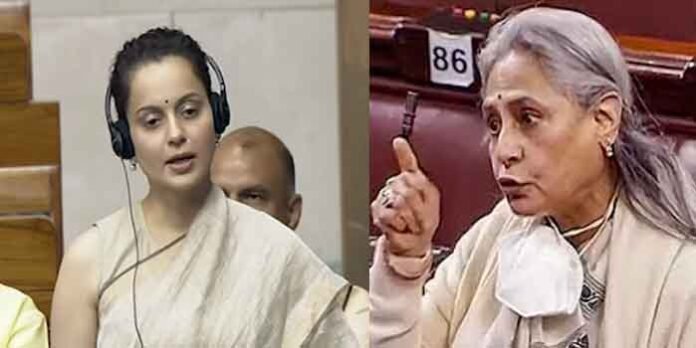INVC NEWS
Mumbai : In the bustling world of Bollywood and Indian politics, few names resonate as strongly as Jaya Bachchan and Kangana Ranaut. Recently, a fresh wave of controversy has emerged from a clash between these two prominent figures, drawing significant attention from the media and public alike. The latest development in this ongoing saga revolves around Kangana Ranaut’s comments on Jaya Bachchan’s emotional response in Parliament. This article delves into the core of this dispute, exploring the implications of their statements and the broader societal reactions.
The Backdrop: Jaya Bachchan’s Parliamentary Outburst
Jaya Bachchan, a revered actress and current Member of Parliament, has always been known for her candid and sometimes fiery nature. Her recent outburst in Parliament, triggered by being addressed by her husband Amitabh Bachchan’s name, has not gone unnoticed. During a parliamentary session, Jaya Bachchan visibly lost her composure when referred to in the context of her husband, which led to a heated exchange.
The incident was widely covered by media outlets, highlighting Bachchan’s sensitivity to personal identifiers, particularly those linked to her family. This display of anger, though not unusual given her passionate personality, caught the attention of fellow politicians and the public, sparking discussions about the appropriateness and implications of such reactions in a legislative environment.
Kangana Ranaut’s Reaction: A Controversial Perspective
Enter Kangana Ranaut, the outspoken actress and BJP MP, who has never shied away from voicing her opinions. Her recent comments about Jaya Bachchan’s outburst have added a new layer to this unfolding drama. Ranaut characterized Bachchan’s reaction as a manifestation of panic attacks and arrogance, which she deems shameful.
Ranaut’s remarks have stirred considerable debate. She suggested that Bachchan’s reaction reflected a broader issue within contemporary feminism, asserting that some women, in their quest for empowerment, have veered into negative territory. According to Ranaut, this shift is problematic and reflects poorly on societal values. Her comments implied that such emotional responses signify a failure to adapt to evolving societal norms and expectations.
The Historical Context: Previous Exchanges Between the Two Actresses
This recent exchange is not the first time Kangana Ranaut and Jaya Bachchan have found themselves at odds. Their feud has roots in earlier incidents, including a notable exchange regarding a comment Bachchan made about a “hole in the plate.” Ranaut’s rebuttal to this statement marked the beginning of a strained relationship between the two.
In that instance, Ranaut criticized Bachchan’s comments, leading to a public spat that highlighted their differing viewpoints. This historical context underscores a recurring theme in their interactions: a clash of ideologies and personal convictions, which has now resurfaced with Ranaut’s latest comments.
Public and Media Reaction: Analyzing the Impact
The media has been quick to capitalize on the drama between Bachchan and Ranaut, using it as fodder for news cycles. Public reactions have been mixed, with some siding with Jaya Bachchan, viewing her reaction as a genuine emotional response to personal and professional pressures. Others have supported Kangana Ranaut, appreciating her candidness and her critique of modern feminist trends.
This dichotomy in public opinion reflects broader societal debates about gender, politics, and the role of personal emotions in public life. The controversy has ignited discussions on social media platforms, with hashtags and discussions proliferating across various forums.
Implications for Feminism and Public Discourse
Kangana Ranaut’s comments have sparked a broader discussion about the state of feminism and its influence on public discourse. By framing Jaya Bachchan’s emotional reaction as a sign of personal inadequacy and arrogance, Ranaut has provoked a conversation about the boundaries of feminist advocacy and the societal expectations placed on women in the public sphere.
This discourse highlights an ongoing tension between traditional views on gender roles and the evolving nature of feminist thought. It raises important questions about how women in prominent positions are perceived and the extent to which personal emotions should be scrutinized in the public domain.
The Way Forward: Navigating Personal and Professional Boundaries
As the controversy continues to unfold, it is essential for both Jaya Bachchan and Kangana Ranaut to navigate this complex landscape with care. For Bachchan, maintaining a balance between personal emotions and professional responsibilities will be crucial in mitigating future conflicts. For Ranaut, articulating her viewpoints with sensitivity and respect can foster more constructive dialogue and reduce the potential for further discord.
Both figures occupy significant spaces in Indian society and politics, and their actions and words resonate widely. As such, their ongoing interactions will likely continue to influence public opinion and media narratives, shaping the broader discourse on gender, politics, and personal conduct.
A Reflection on the Current Dispute
The recent clash between Jaya Bachchan and Kangana Ranaut serves as a potent reminder of the complexities inherent in public life. It underscores the challenges faced by prominent figures in balancing personal emotions with professional responsibilities. As this dispute develops, it offers valuable insights into the nature of contemporary debates surrounding feminism, public conduct, and the role of personal identity in the political sphere.
In conclusion, while the conflict between Bachchan and Ranaut may seem like a clash of personalities, it represents a deeper conversation about societal values and expectations. As both women continue to make headlines, their actions and statements will undoubtedly influence the broader dialogue on these critical issues.
















